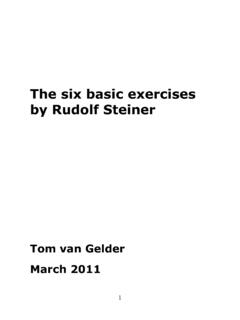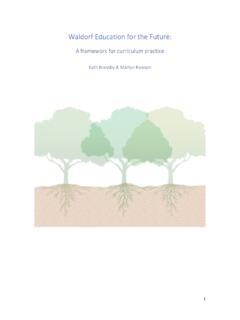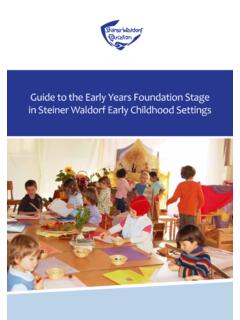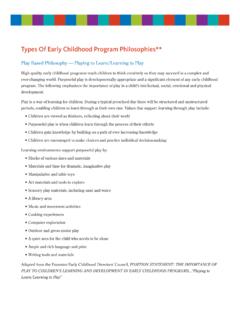Transcription of Holistic Education: An Approach for 21 Century
1 International Education Studies Vol. 5, No. 2; April 2012 ISSN 1913-9020 E-ISSN 1913-9039 178 Holistic Education: An Approach for 21 Century Sirous Mahmoudi (Corresponding Author) Department of Education, University of Isfahan, PO Box: 81746-73441, Isfahan, Iran Tel: 98-917-123-5166 E-mail: Ebrahim Jafari Associate Professor, School of Education and Psychology University of Isfahan, PO Box: 81746-73441, Isfahan, Iran Tel: 98-311-793-2500 E-mail: Hasan Ali Nasrabadi Associate Professor, School of Education and Psychology University of Isfahan, PO Box: 81746-73441, Isfahan, Iran Tel: 98-311-793-2500 E-mail: Mohmmd Javad Liaghatdar Associate Professor, School of Education and Psychology University of Isfahan, PO Box: 81746-73441, Isfahan, Iran Tel: 98-311-793-2500 E-mail: Received.
2 December 14, 2011 Accepted: December 19, 2011 Online Published: May 9, 2012 URL: Abstract Holistic education encompasses a wide range of philosophical orientations and pedagogical practices. Its focus is on wholeness, and it attempts to avoid excluding any significant aspects of the human experience. It is an eclectic and inclusive movement whose main characteristic is the idea that educational experiences foster a less materialistic and a more spiritual worldview along with more dynamic and Holistic views of reality It also proposes that educational experience promote a more balanced development of and cultivate the relationship among the different aspects of the individual (intellectual, physical, spiritual, emotional, social and Aesthetic), as well as the relationships between the individual and other people, the individual and natural environment, the inner- self of students and external.
3 World, emotion and reason, different discipline of knowledge and different form of knowing. Holistic education is concerned with life experience, not with narrowly defined'' basic skills". Keyword: Education, Holistic education, Wholeness, Spirituality 1. Introduction Holistic education is a fairly new movement, which began to take form as a recognizable field of study and practice in the mid-1980s in North America(R, Miller 2004). It emerged as a response to the dominant worldview of mainstream education, often referred to the mechanistic or Cartesian-Newtonian worldview. Rather than attempting to provide a model of education, Holistic education seeks to challenge the fragmented, Reductionistic assumptions of mainstream culture and education(R, Miller2000a, Schreiner2005). In other words, Holistic education is concerned with underlying worldviews or paradigms in an attempt to transform the foundations of education (Nakagava2001).
4 As Ron Miller (1992), one of the leaders of the movement, argues, Holistic education is not to be defined as a particular method or technique; it must be seen as a paradigm, a set of basic assumptions and principles that can be applied in diverse ways. International Education Studies Vol. 5, No. 3; June 2012 Published by Canadian Center of Science and Education 179 Holistic education addresses the broadest development of the whole person at the cognitive and affective levels (Singh, 1996). It aims for the fullest possible human development enabling a person to become the very best or finest that they can be and develop fully those capacities that together make up a human being (Forbes, 2003). A main element of Holistic education is its focus on the interconnectedness of experience and reality.
5 Holistic education attempts to develop a pedagogy that is interconnected and dynamic and thus is in harmony with the cosmos In contrast, much of traditional education tends to be static and fragmented, ultimately promoting alienation and suffering (Neves, 2009). Holistic education focuses on the relationship between the whole and the part and suggests that teaching and learning approaches need to be rooted in a larger vision. If techniques are isolated and unrelated they can become traditional education tends to be static and fragmented, ultimately promoting alienation and suffering (J, Miller 2006). Within this Holistic perspective, the student is positioned as an active, participatory and critical learner who perceives and understands him/ dysfunctional. The Holistic vision includes a sense of the whole person who is connected to his or her urrounding context and environment.
6 (J, Miller 2004) Another author, Scott Forbes (2003), has written that: Holistic education frequently claims that it wants to, 1) educate the whole child (all parts of the child), 2) educate the student as a whole (not an assemblage of parts), and 3) see the child as part of a whole (society, humanity, the environment, some spiritual whole, etc.) from which it is not meaningful to extract the student. (p. 2) Holistic education challenges the present Approach to education and its obsessive focus on standards and testing. Holistic educators see this Approach as reflecting a materialist and consumerist culture that has reduced schooling to the training of individuals to compete and consume in the global marketplace. In fact, the present thrust can be seen as abandoning any attempt to educate the whole human being.
7 It reduces schooling to training for the workplace that can be easily assessed through standardized tests. (J, Miller 2007) Holistic education challenges the present Approach to education and its obsessive focus on standards and testing. Holistic educators see this Approach as reflecting a materialist and consumerist culture that has reduced schooling to the training of individuals to compete and consume in the global marketplace. In fact, the present thrust can be seen as abandoning any attempt to educate the whole human being. It reduces schooling to training for the workplace that can be easily assessed through standardized tests. (R, Miller 2004). Holistic educators are convinced that the further evolution of civilization and human consciousness requires a renewed measure of respect and reverence for the inner life of the growing person.
8 (R, Miller 2006). Holistic education provides students with a sense of meaning and order to things. By introducing students to a Holistic view of the planet, life on Earth, and the emerging world community, as a context of meaning, Holistic strategies enable students to perceive and understand the various contexts which shape and give meaning to life. (Clark 1991) Holistic education is a journey for both the educator and the student. For both, the nature of Holistic education can change as they each progress through the programme, and draw different experiences from it. The process of Holistic education must therefore be flexible and dynamic to accommodate these personal differences and influences and, moreover, differences in the rate of personal progression (Hare2006). Holistic education is , without a doubt , education for twenty- first Century , directed towards developing human beings with a global conscience , a vision of peace, love, and intelligence(Nava 2001).
9 2. Historical Roots of Holistic Education The Holistic ideal can be traced back to indigenous cultures. In general, the aboriginal or indigenous person sees the earth and the universe as infused with meaning and Holistic educators try to recover this sense of meaning and purpose in education. (J, Miller 2004) The concept of holism comes from the Greek concept of holon that sees the universe as made up of integrated wholes that cannot be reduced in parts. (lee 1997) The Greeks argued for a Holistic Approach in learning. Socrates can be seen as a Holistic educator because he encouraged each person to examine his or her own life: "know thyself." (J, Miller 2007). The Holistic paradigm emerged as a vibrant and coherent intellectual movement in the 1980s and has been expressed by thinkers in divers education is not synonymous with the" New Age" movement, nor is it a product of the 1960s counterculter: it has deep roots in ancient spiritual traditions and cosmologies, which Aldous Huxley described as the perennial philosophy.
10 When the so-called Enlightenment of the eighteenth Century elevated analytical, scientific reason to neartotal dominance in the west , this perennial wisdom - the recognition of humanitys intimate connection to the evolving cosmos was relegated to a dissident movement labeled romanticism. Holistic education thus has its roots in the "romantic" educational theories of Jean Jacques Rousseau, Pestalozzy, and Frobel ( R,Miller 1991a). Rousseau , Pestalozzy, and Frobel along with other Holistic educaters of 19th and earle 20th centuries such as transcendentalists William Ellery, chaning, rulf waldo emerson,Henry david International Education Studies Vol. 5, No. 2; April 2012 ISSN 1913-9020 E-ISSN 1913-9039 180 Thoreau,Bronson Alcott, and fransis parker as well as Montessori and rudolf steiner , all emphasized the spiritual nature of the human being.

















